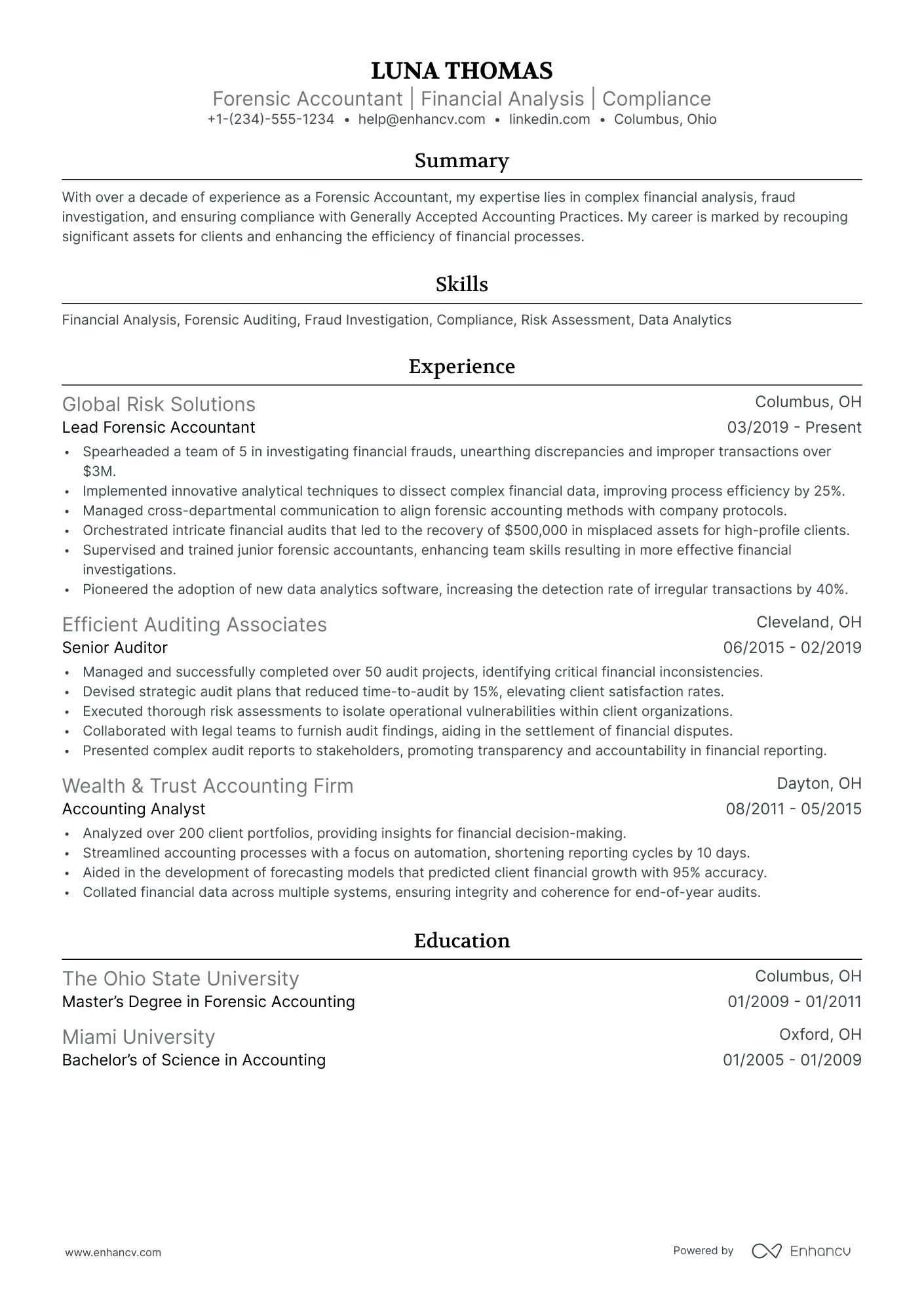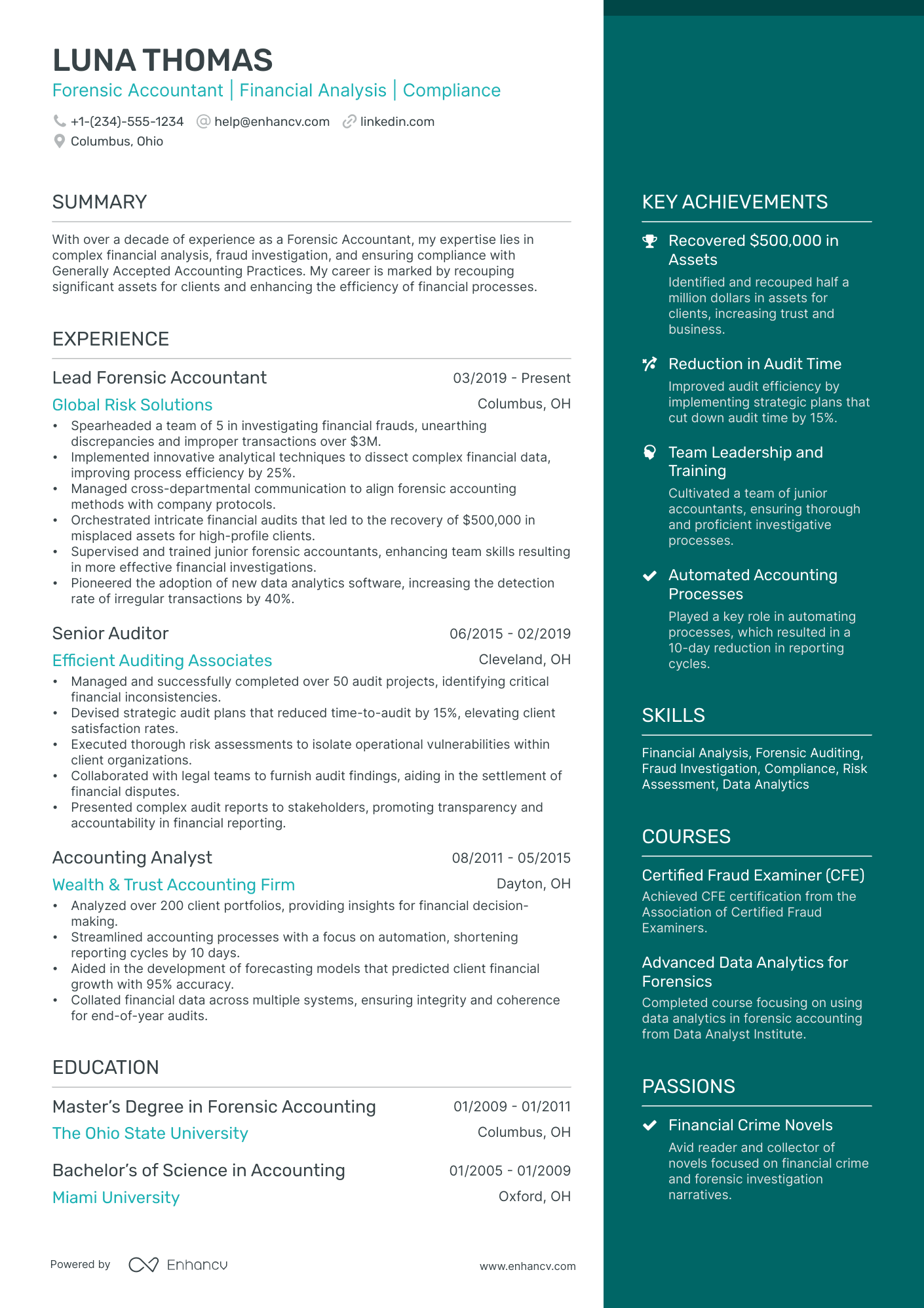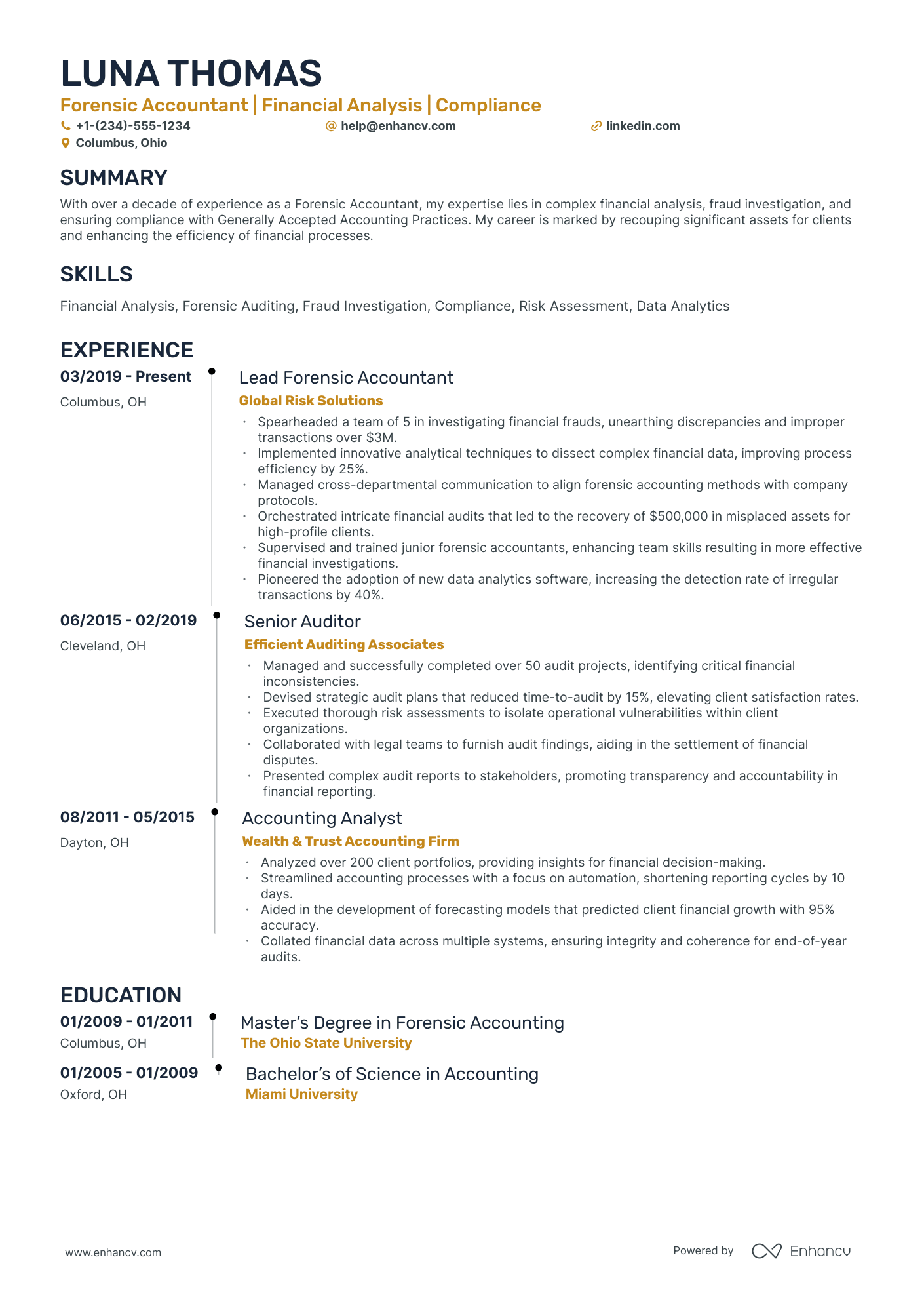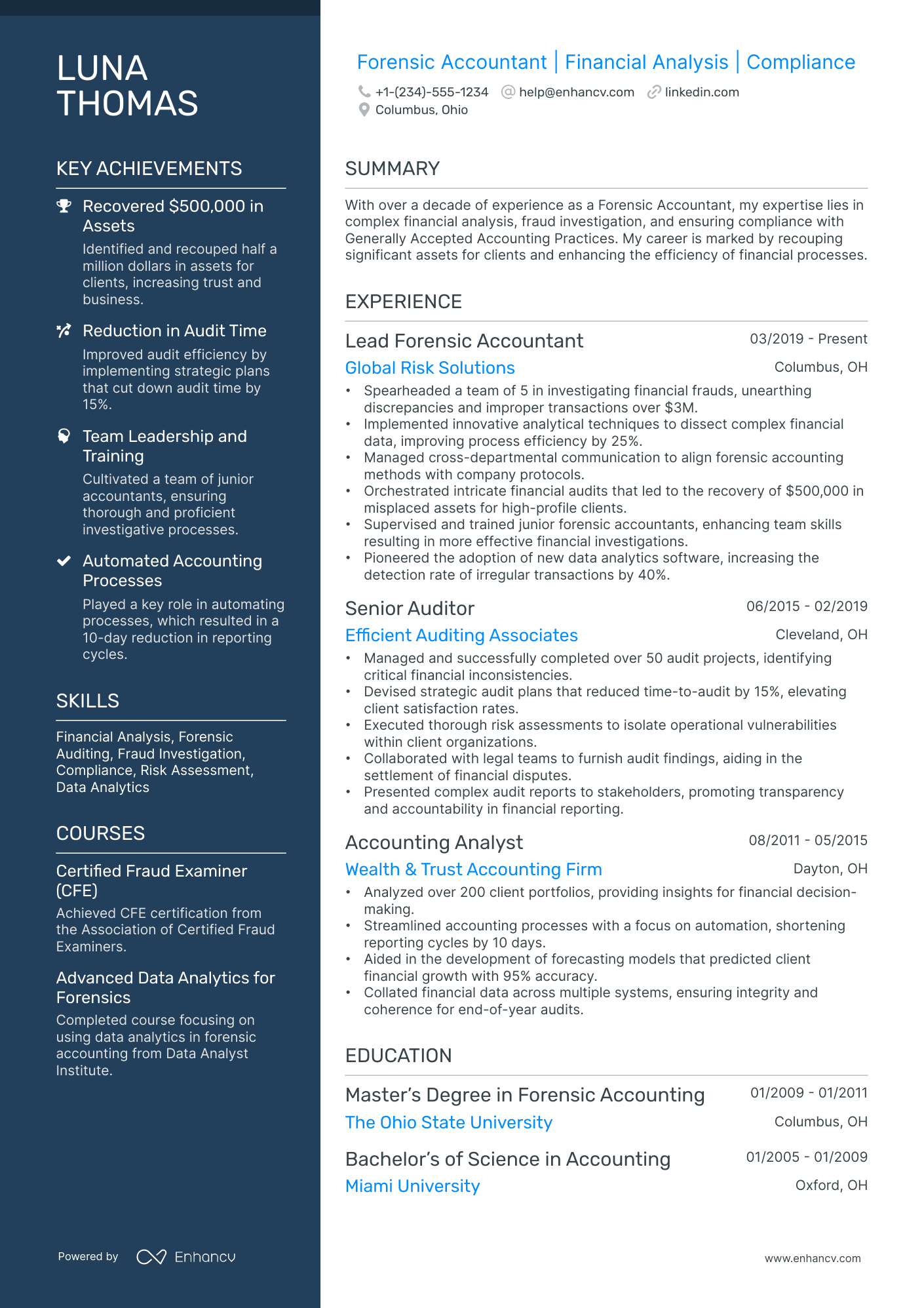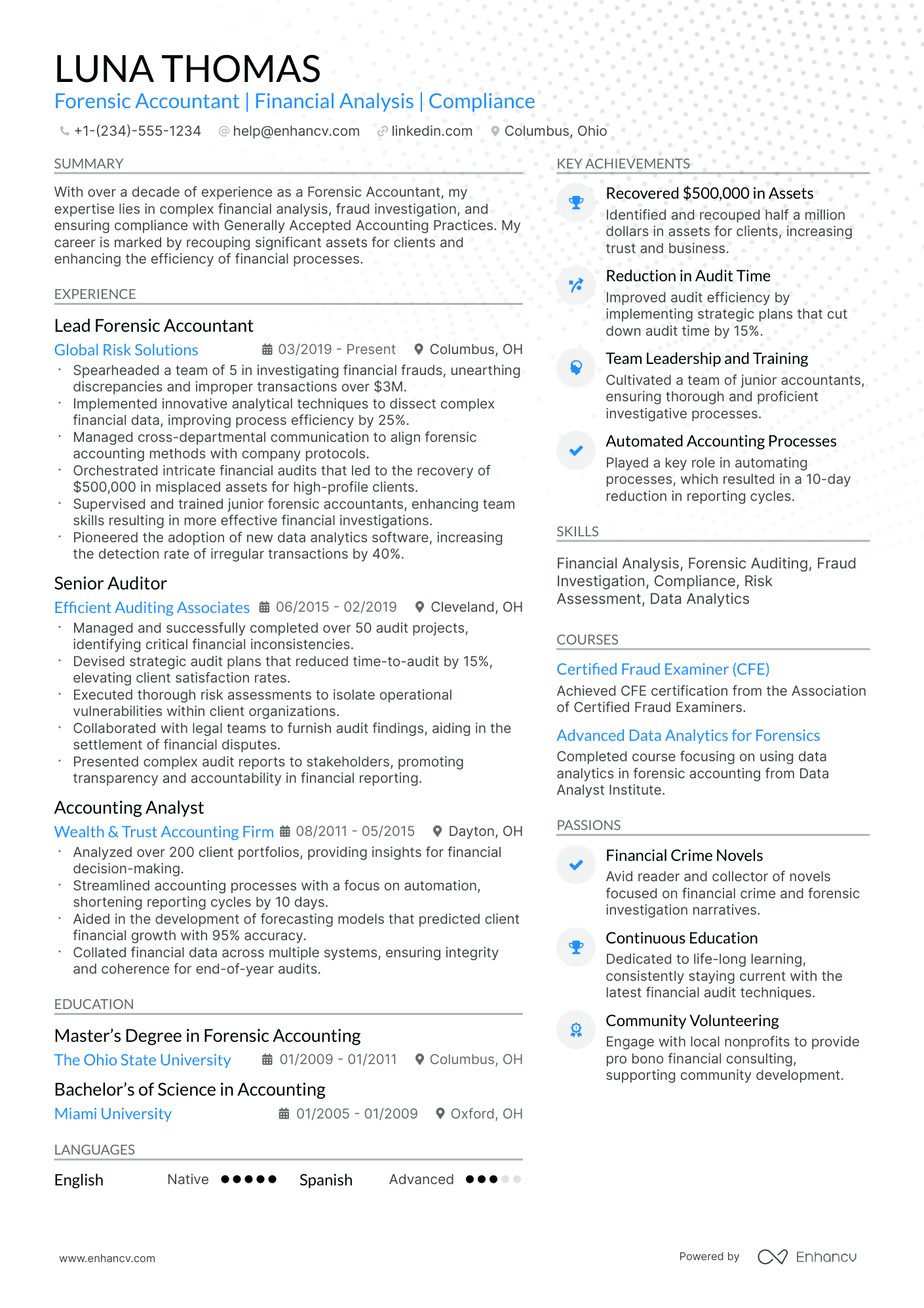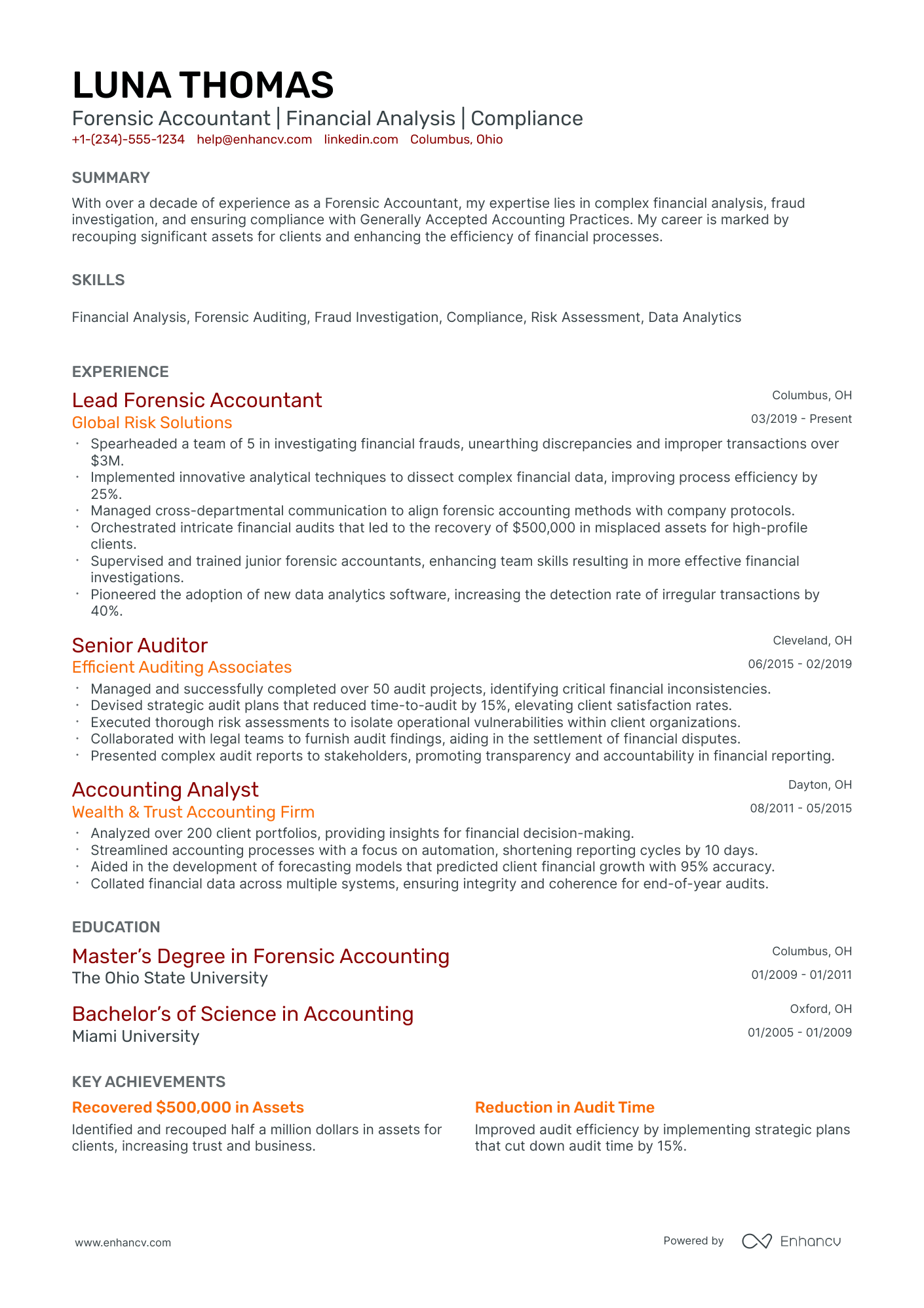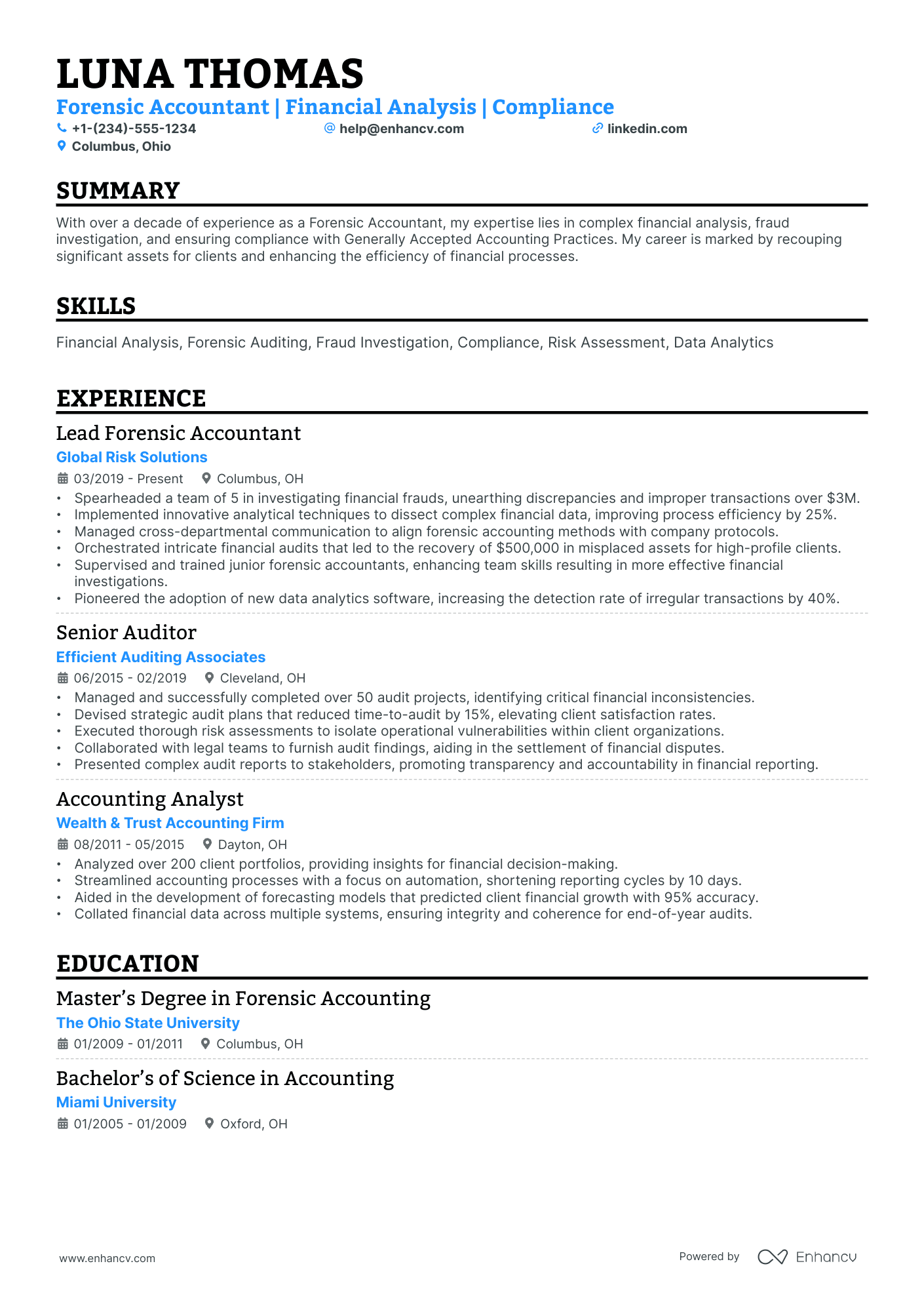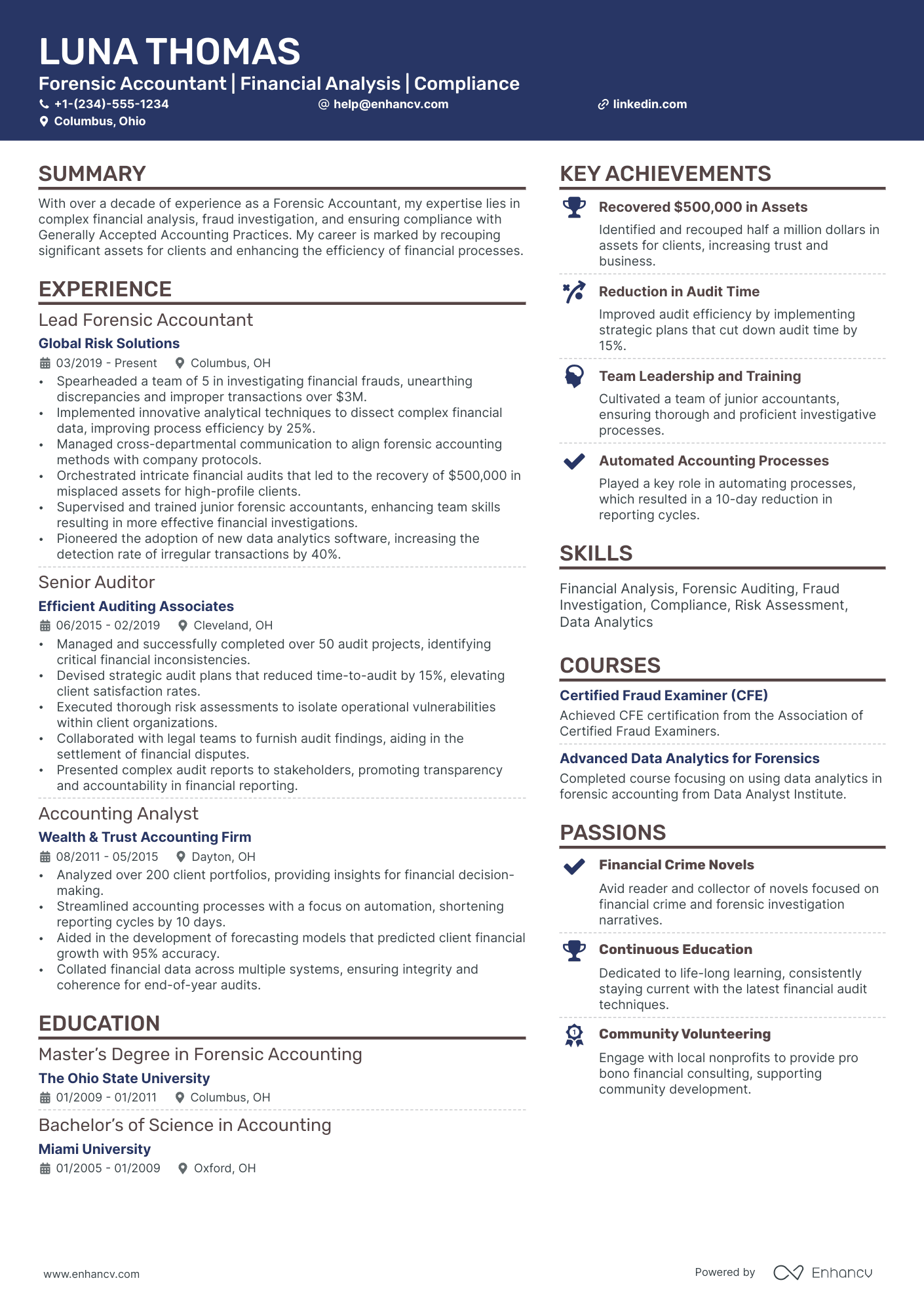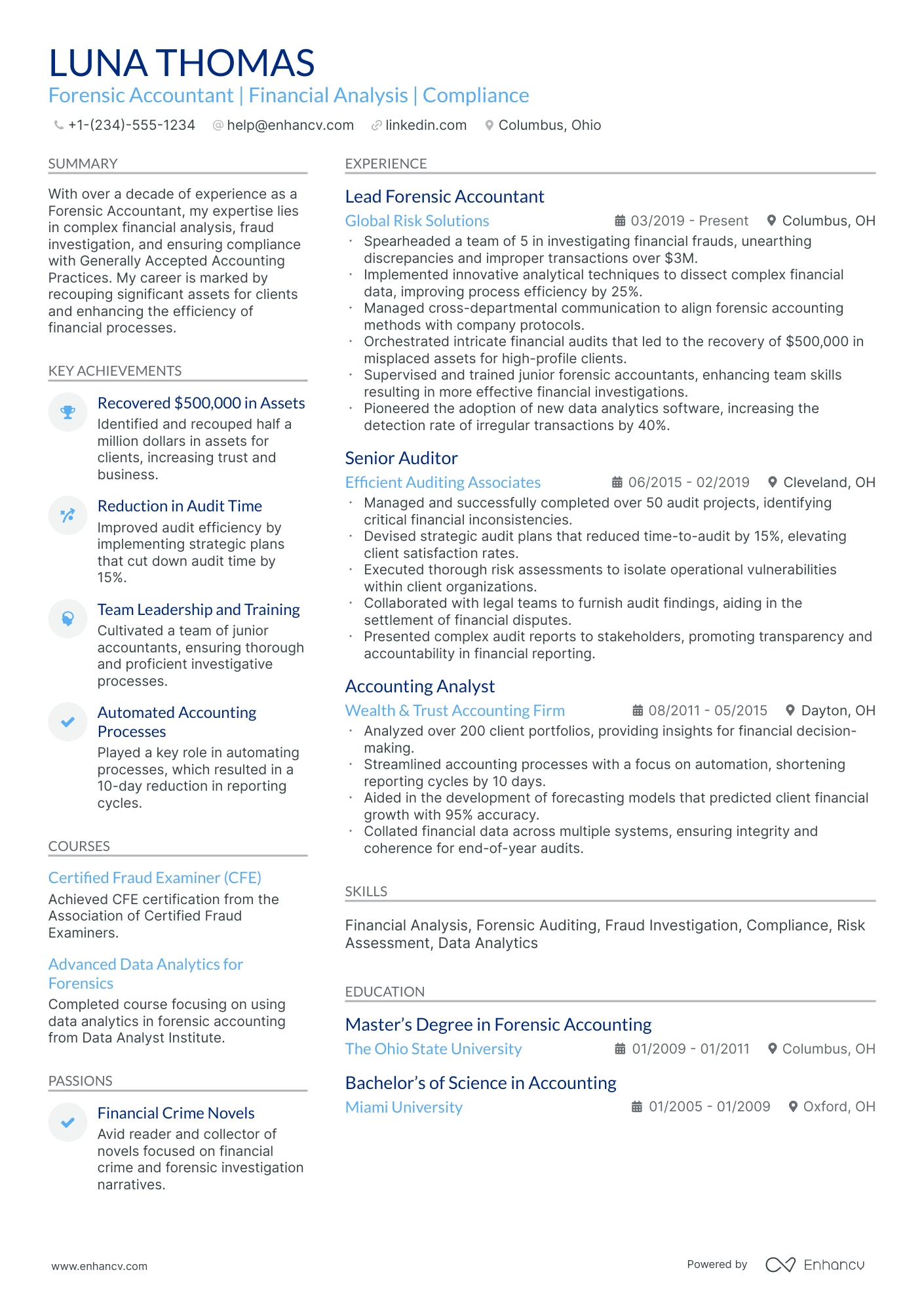One resume challenge you might face as a forensic accountant is effectively showcasing your ability to handle complex financial investigations and data analysis. Our guide provides insightful tips on articulating these specialized skills, ensuring you stand out to potential employers.
- Forensic accounting resumes that are tailored to the role are more likely to catch recruiters' attention.
- Most sought-out forensic accounting skills that should make your resume.
- Styling the layout of your professional resume: take a page from forensic accounting resume examples.
How to write about your forensic accounting achievements in various resume sections (e.g. summary, experience, and education).
- Finance Intern Resume Example
- Purchasing Director Resume Example
- Billing Manager Resume Example
- Phone Banking Resume Example
- Cost Accounting Resume Example
- Financial Management Specialist Resume Example
- Construction Accounting Resume Example
- Corporate Banking Resume Example
- Bookkeeper Resume Example
- Management Accounting Resume Example
Optimize your forensic accounting resume format to pass the recruiters' assessment
You may be wondering just how much time you need to spend on designing your forensic accounting resume.
What recruiters are looking for is systematised content that is clear and coherent. Thus, your forensic accounting resume needs to answer requirements and why you're the best candidate for the role from the get-go.
Often, a clear layout consists of:
- Sorting your experience in the reverse chronological order - starting with your most recent and relevant roles. This is an excellent choice for more experienced professionals;
- Writing your contact information (e.g. personal phone number and email address) and your portfolio or LinkedIn link in your forensic accounting resume header. If you're wondering to include a photo or not, always make sure that it's appropriate for the country you're applying in;
- Use the basic, most important forensic accounting resume sections - your experience, education, summary, etc. Use your resume's real estate wisely to tell a compelling, professional story and match job description's keywords;
- Don't go overboard with the length of your resume. One page is absolutely fine if you happen to have under a decade of relevant experience.
Are you still wondering if you should submit your forensic accounting resume in PDF or Word format ? The PDF has a few more advantages, as it doesn't change the format and the text can't be altered upon application.
Format matters most when your forensic accounting resume is assessed by the Applicant Tracker System (or the ATS).
The ATS parses resumes, looking for specific keywords, skills or experience that match the job description.
P.S. We recently did a study on how the ATS works and were able to demystify three of the biggest misconceptions about how it assesses candidate resumes.
To pass the ATS evaluation, select any of the serif or sans-serif fonts. Popular choices that would help your forensic accounting resume stand out include Raleway, Exo 2, Montserrat, etc.
Most traditionalists go for Arial or Times New Roman, but it's often the case that many candidates choose these fonts, and you'd thus lose points on the uniqueness front.
Targeting Canada? – Keep in mind their resume layout may differ from others.
Upload & Check Your Resume
Drop your resume here or choose a file. PDF & DOCX only. Max 2MB file size.
PRO TIP
List your educational qualifications and certifications in reverse chronological order.
The key to your forensic accounting job-winning resume - present your expertise with these sections:
- A header to make your resume more scannable
- Snapshot of who you are as a professional with your resume soft skills, achievements, and summary or objective
- Job advert keywords in the skills section of your resume
- Resume experience quantifying your past job successes with metrics
- A relevant education, certification, and technical sills section to provide background to your technological/software capabilities
What recruiters want to see on your resume:
- Demonstrated knowledge of accounting principles, forensic auditing standards, and understanding of financial fraud schemes.
- Certifications specific to the field, such as Certified Fraud Examiner (CFE) or Certified Public Accountant (CPA) with additional forensic accounting credentials.
- Experience with legal processes and providing expert witness testimony in court, including understanding of evidence handling and documentation procedures.
- Proficiency in forensic accounting software and tools, as well as advanced data analysis techniques for uncovering irregularities and fraudulent activities.
- Strong ethical standards and integrity, with a track record of handling sensitive information confidentially and conducting investigations with impartiality.
The forensic accounting resume experience section: a roadmap to your expertise
The resume experience section provides you with an opportunity to tell your professional narrative.
Recruiters, reading between the lines of your resume, use the experience section to better understand your unique skill set, accomplishments, and what unique value you bring about.
Discover five quick steps on how to write your experience section:
- Curate only relevant experience items to the role and include the company, description, and dates; all followed by up to six bullets per experience item;
- Each experience item should feature tangible results of your actions - if you can include a number or percent, this will further highlight your aptitude;
- If you've received any managerial or customer feedback, use short excerpts of it as further social proof of your technical or people skills;
- Make sure you're using the appropriate verb tense when listing your responsibilities;
- Within the description for each role, you could summarize your most noteworthy and relevant achievements.
Now, take note of how a real-world forensic accounting professional received opportunities at industry leaders with these resume experience sections:
- Led a team of forensic accountants in uncovering a complex financial fraud scheme over two years, identifying over $10 million in misappropriated funds
- Developed and implemented innovative data analysis techniques using advanced software tools to trace illicit financial transactions across multiple jurisdictions
- Testified as an expert witness in federal court, contributing to a 95% conviction rate for financial crime cases supported
- Managed forensic accounting investigations for high-profile corporate bankruptcy cases, effectively recovered assets totaling over $25 million
- Served as the primary liaison between the forensic accounting team and law enforcement agencies, ensuring seamless collaboration and information flow
- Conducted in-depth financial statement analysis and identified accounting irregularities that led to the restatement of three years' worth of financial reports for a client company
- Conducted over 50 forensic accounting audits for mid-sized businesses, identifying cases of fraud and embezzlement totaling upwards of $5 million
- Authored detailed forensic accounting reports that were critical in the strategic planning and decision-making process for client businesses to prevent future fraud incidents
- Pioneered a proprietary risk assessment model that reduced fraud detection timelines by 30%, significantly increasing team efficiency
- Played a key role in a multinational anti-money laundering project, analyzing financial transactions across 20+ countries and reporting suspicious activities
- Assisted in the design and implementation of compliance programs that decreased the risk of financial fraud for clients by 40% over a 12-month period
- Mentored junior forensic accountants, resulting in a 25% increase in departmental productivity and professional development
- Executed forensic examinations of financial statements and related documents in over 20 high-stakes litigation support cases
- Effectively communicated complex financial data and findings to non-financial audiences through the creation of clear and concise presentation materials
- Strengthened internal controls for five major clients, significantly mitigating the risk of fraud and enhancing operational transparency
- Led a company-wide initiative to implement forensic accounting software, reducing investigation times for fraud case by an average of 20%
- Directed and coordinated international forensic investigations related to intellectual property theft, helping to safeguard client assets valued at over $30 million
- Prepared comprehensive forensic reports and exhibits for civil litigation cases that effectively supported legal strategies and facilitated favorable settlements
- Identified, investigated, and resolved fraudulent financial misstatements for Fortune 500 companies, thereby preserving stakeholder value and market reputation
- Championed the development of a fraud detection training program that increased departmental awareness and skill sets in identifying financial anomalies
- Presented forensic accounting findings to audit committees and executive boards, which resulted in the implementation of improved financial oversight mechanisms
- Orchestrated a complex cross-border forensic accounting project that recovered over $15 million in misallocated funds for a multinational corporation
- Developed data-driven forensic accounting strategies that improved fraud detection rates by 35% within the first year of implementation
- Facilitated training programs for regulatory compliance that enabled clients to stay ahead of changing financial laws and minimize legal exposure
Quantifying impact on your resume
- Include the total amount of fraudulent transactions identified to demonstrate your investigative skills.
- List the number of forensic audits conducted to show your experience level.
- Mention the percentage of recovered assets due to your intervention to highlight your effectiveness.
- Specify the size of budgets you have managed or audited to illustrate your capability with large-scale finance.
- Detail the number of litigation support cases you have worked on to showcase your legal and accounting expertise.
- Indicate the amount of cost reductions achieved through your internal control recommendations to emphasize your contribution to profitability.
- Quantify the number of compliance reports you've prepared to reflect your knowledge of regulatory requirements.
- Mention any quantifiable improvements in financial systems or processes due to your recommendations to underline your proficiency in systems optimization.
Action verbs for your forensic accounting resume
Writing your forensic accounting experience section without any real-world experience
Professionals, lacking experience, here's how to kick-start your forensic accounting career:
- Substitute experience with relevant knowledge and skills, vital for the forensic accounting role
- Highlight any relevant certifications and education - to showcase that you have the relevant technical training for the job
- Definitely include a professional portfolio of your work so far that could include university projects or ones you've done in your free time
- Have a big focus on your transferable skills to answer what further value you'd bring about as a candidate for the forensic accounting job
- Include an objective to highlight how you see your professional growth, as part of the company
Recommended reads:
PRO TIP
List all your relevant higher education degrees within your resume in reverse chronological order (starting with the latest). There are cases when your PhD in a particular field could help you stand apart from other candidates.
Featuring your hard skills and soft skills on your forensic accounting resume
The skills section of your forensic accounting resume needs to your various capabilities that align with the job requirements. List hard skills (or technical skills) to showcase to potential employers that you're perfectly apt at dealing with technological innovations and niche software. Meanwhile, your soft skills need to detail how you'd thrive within your new, potential environment with personal skills (e.g. resilience, negotiation, organization, etc.) Your forensic accounting resume skills section needs to include both types of skills to promote how you're both technical and cultural fit. Here's how to create your bespoke forensic accounting skills section to help you stand out:
- Focus on skill requirements that are listed toward the top of the job advert.
- Include niche skills that you've worked hard to obtain.
- Select specific soft skills that match the company (or the department) culture.
- Cover some of the basic job requirements by including important skills for the forensic accounting role - ones you haven't been able to list through the rest of your resume.
Get inspired with our forensic accounting sample skill list to list some of the most prominent hard and soft skills across the field.
Top skills for your forensic accounting resume:
Financial Analysis
Data Analytics Software (e.g., ACL, IDEA)
Accounting Software (e.g., QuickBooks, SAP)
Microsoft Excel
Fraud Detection Techniques
Forensic Investigation Tools
Audit Software
Case Management Software
Database Management Systems
Tax Compliance Tools
Attention to Detail
Analytical Thinking
Problem-Solving
Communication Skills
Ethical Judgment
Interpersonal Skills
Time Management
Critical Thinking
Adaptability
Negotiation Skills
PRO TIP
If you happen to have plenty of certificates, select the ones that are most applicable and sought-after across the industry. Organize them by relevance to the role you're applying for.
The forensic accounting resume sections you may underestimate: certifications and education
Your education and certifications provide insight into both your technical capabilities and personal attributes, such as perseverance. When crafting your forensic accounting resume, consider how you present these elements:
- For your higher education degrees, prioritize listing those most relevant to the job or indicative of your academic dedication;
- Include applicable coursework as a stand-in for relevant experience or if it might impress recruiters;
- Include incomplete higher education only if it's pertinent to meeting job requirements;
- If your degree is from a renowned university, mention how often you made the Dean's list to underline academic excellence.
Regarding certifications, it's not necessary to list all of them. Instead, match up to three of your most recent or significant certificates with the technical skills required in the job description.
Below, we've selected some of the top industry certifications that could be vital additions to your forensic accounting resume.
The top 5 certifications for your forensic accounting resume:
- Certified Fraud Examiner (CFE) - Association of Certified Fraud Examiners
- Certified Public Accountant (CPA) - American Institute of Certified Public Accountants
- Certified Forensic Accountant (Cr.FA) - American Board of forensic accounting
- Certified in Financial Forensics (CFF) - American Institute of Certified Public Accountants
- Chartered Accountant (CA) - Various global chartered accountancy bodies
PRO TIP
If you happen to have some basic certificates, don't invest too much of your forensic accounting resume real estate in them. Instead, list them within the skills section or as part of your relevant experience. This way you'd ensure you meet all job requirements while dedicating your certificates to only the most in-demand certification across the industry.
Recommended reads:
Deciding between a resume summary or objective for your forensic accounting role
Understanding the distinction between a resume summary and an objective is crucial for your forensic accounting resume.
A resume summary, typically three to five sentences long, offers a concise overview of your career. This is the place to showcase your most pertinent experience, key accomplishments, and skills. It's particularly well-suited for those with professional experience relevant to the job requirements.
In contrast, a resume objective focuses on how you can add value to potential employers. It addresses why they should hire you and outlines your career expectations and learning goals. Therefore, it's ideal for candidates with less experience.
In the following section of our guide, explore how resume summaries and objectives differ through some exemplary industry-specific examples.
Resume summaries for a forensic accounting job
- Seasoned forensic accountant with over 12 years of experience in corporate fraud investigations at a leading New York financial firm. Expert in utilizing advanced data analysis and financial modeling to uncover fraudulent activities. Key achievement includes leading a high-profile embezzlement case, resulting in the recovery of $5 million in misappropriated funds.
- Accomplished internal auditor pivoting to forensic accounting, bringing forth expertise in compliance and risk management from a decade-long tenure at a Fortune 500 company. Proven track record in implementing robust audit strategies that significantly decrease financial discrepancies and errors.
- Dynamic financial analyst aspiring to transition into forensic accounting, equipped with an acute aptitude for statistical analysis and predictive modeling gained from 5 years in the fast-paced tech industry of Silicon Valley. Recognized for identifying overlooked cost-saving opportunities, culminating in a $3 million budget optimization project.
- Dedicated professional with a Master's degree in Criminology, eager to apply 6 years of research and analytical skills to the field of forensic accounting. Spearheaded a university-funded white-collar crime study, which has been cited in major criminological journals and at international conferences.
- Determined to leverage a strong foundation in accounting principles and a passion for justice to explore forensic accounting, having freshly graduated summa cum laude from the University of Chicago with a B.S. in Accounting. Poised to apply outstanding academic learning and enthusiasm for unveiling financial misdeeds to contribute to meaningful investigative work.
- Eager to embark on a forensic accounting career with a fresh perspective from a cybersecurity background, armed with an intricate understanding of digital financial transactions and data breaches. Successfully led a cybersecurity team to detect and prevent a series of sophisticated phishing attacks that could have affected 10,000+ users.
Optimize your resume summary and objective for ATS
Drop your resume here or choose a file.
PDF & DOCX only. Max 2MB file size.
Additional valuable forensic accounting resume sections to stand out
When assessing candidate applications, recruiters are often on the lookout for elements that go beyond meeting standard requirements and technical expertise.
This is where extra sections could play a key role in showcasing your unique skill set and personality.
Make sure to include sections dedicated to:
- How you spend your free time, outside of work. The interests resume section also goes to show your personality and transferrable skills; and may also serve to fill in gaps in your experience;
- Most innovative work. The projects resume section brings focus to what you're most proud of within the field;
- How you're able to overcome language barriers. The language resume section is always nice to have, especially if communication would be a big part of your future role;
- Industry-wide recognitions. Remember that the awards resume section should highlight your most noteworthy accolades and prizes.
Key takeaways
Writing your forensic accounting resume can be a structured and simple experience, once you better understand the organization's requirements for the role you're applying to. To sum up, we'd like to remind you to:
- Always select which experiences, skills, and achievements to feature on your resume based on relevancy to the role;
- In your resume summary, ensure you've cherry-picked your top achievements and matched them with the job ad's skills;
- Submit your forensic accounting resume as a one or two-page long document at the most, in a PDF format;
- Select industry leading certifications and list your higher education to highlight you have the basis for technical know-how;
- Quantify your people's skills through various resume sections (e.g. Strengths, Hobbies and interests, etc.) to show recruiters how your profile aligns with the organizational culture.
